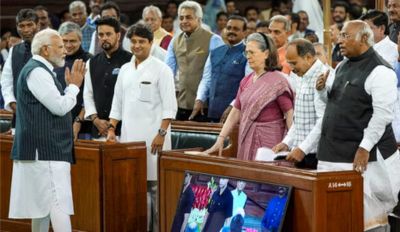A special five-day session of Parliament called by the government during ‘Amrit Kaal’ began on Monday, September 18, 2023. This comes amid an intense speculation about the government’s agenda for the rare move. The five-day special session of the Parliament began at 11 am on Monday. The session was held in the old Parliament building, and MPs moved into the new building on Tuesday, the second day of the special session.
Indian lawmakers, including PM Narendra Modi, have paid tribute to the country’s old parliament ahead of a move to a new building. While addressing media persons outside Parliament, PM Modi said that several important decisions will be taken during this special session of Parliament. The Prime Minister called on MPs to pledge to work towards making India a developed country by 2047.
The special session is being held amid criticism from opposition leaders who claim that the government has not disclosed all the business that could come up during the week.According to the government, eight bills have been listed for discussion during the session – but this agenda could be changed or expanded during the course of the week.Opposition leaders have questioned whether a special session was necessary to discuss these bills when MPs are set to meet later this year for the winter session of parliament.

Indian lawmakers usually meet for regular business three times a year in parliament – a budget session, a monsoon session and a winter session. On Monday, Mr Modi began the special session by commemorating the legacy of India’s parliament since 1947, when the country became independent from British rule. The government has held several events to mark the 75th anniversary of India’s independence.
Modi said that leaving the old parliament was an “emotional moment” as the building was filled with special memories and that the structure would continue to inspire future generations. “The biggest achievement of this parliament is that it has kept people’s faith in democracy alive,” he said in a speech where he also mentioned India’s successful Moon landing and hosting of the G20 summit.
“Well, this building is full of memories as the PM also said, it is full of history. It will be a sad moment. Let’s hope that the new building has better facilities, new technology and more convenience for the members of the Parliament. But still, it is always an emotional moment to leave an institution which is so full of history and memories,” Shashi Tharoor added.
The new building
A day before the special session Vice President and Rajya Sabha Chairman Jagdeep Dhankhar on Sunday hoisted the national flag atop the “Gaja Dwar” of the new Parliament building.For the new Parliament building, this will be the first session.
A new dress code has been announced for the parliamentary staff of various departments. The new dress code with floral motif for a section of staff has already kicked up a political row, with the Congress dubbing it as a “cheap” tactic to promote the ruling party’s poll symbol — the lotus flower.
Old vs new building
Designed by British architects Sir Edwin Lutyens and Herbert Baker, the existing historic Parliament House Complex has stood for over 96 years and is a repository of India’s democratic journey. The new building has been designed by Ahmedabad-based HCP Design, Planning and Management led by architect Bimal Patel.
All the political parties with a presence in Parliament have issued a whip to their Parliamentarians, directing them to ensure their presence during the special session.
The government has listed some bills and marking the 75 years of India’s Independence as its agenda for the special session.
But the Opposition has not seemed satisfied, indicating that the special session, possibly in the new building, may follow the old suit of shouting, sloganeering and ruckus over the government’s “hidden agenda”.
A special discussion on Parliament’s journey of 75 years starting from the “’Samvidhan Sabha” (Constituent Assembly) is listed on the agenda.Four bills including the appointment of the Chief Election Commissioner and other election commissioners to be taken up during the session.
And a custom
The customary all-party meeting was called by the government on Sunday on the eve of the special session of Parliament. Floor leaders of all parties attended the meeting.
Several parties made a pitch for the passage of the Women’s Reservation Bill, giving 33% quota to women candidates in elections. The government has responded by saying that an appropriate decision on the women’s quota bill would be taken at the right time.
Special sessions are not that common – according to legislative expert Chakshu Roy, the government has sometimes convened them “for specific occasions, like commemorating parliamentary or national milestones”.
